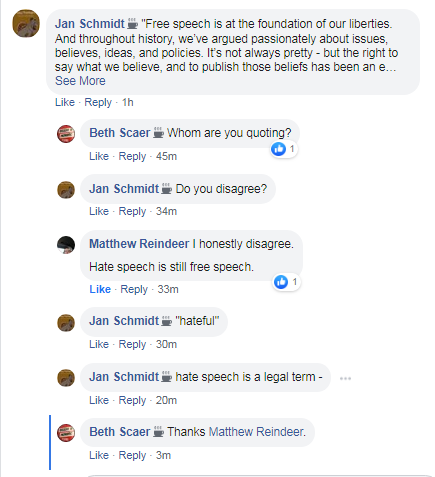Nashua Democrat Jan Schmidt is the co-sponsor of a proposed bill that would define (presumably) a point where interacting with a public official online becomes cyberstalking or bullying. Jan is no friend of free speech, but she thinks she is and to make the case she borrows someone else’s.
In a recent Facebook update she posts,
Her update is in quotes, but she never provides attribution and never answers Beth’s question, at least as of this writing.
To the larger more important question, the US Supreme Court has been clear. There is no exception for “hate speech” in the First Amendment. None. Nor can the state make a separate case to define and regulate it; care of Justice Thomas,
States cannot punish protected speech because some group finds it offensive, hurtful, stigmatic, unreasonable, or undignified. “If there is a bedrock principle underlying the First Amendment, it is that the government may not prohibit the expression of an idea simply because society finds the idea itself offensive or disagreeable.”
As to the quote shared by Alderman Jan, it is from a 2016 Forbes.com article by Steven Rosenbaum.
Free speech is at the foundation of our liberties. And throughout history, we’ve argued passionately about issues, believes, ideas, and policies. It’s not always pretty – but the right to say what we believe, and to publish those beliefs has been an essential part of liberty.
In this past year, something changed.
Free speech morphed into hateful speech. Vile, angry, threatening, racist, misogynist epithets fired like weapons at political opponents. And, thanks to the remarkable power of the internet – much of those word-weapons were fired anonymously.
The article is three years old. The “past year” to which the original author referred is 2016, though lacking attribution Jan gives the impression it means since the November 2018 election.
To its credit, the piece brings up some points to ponder. Anonymous commenters who are saying awful things and implying actionable threats are troubling. But this is no excuse to leverage the idea of internet speech policing by platform owners or governments as the responsible solution.
If liberty means anything at all, it means the right to tell people what they do not want to hear. – George Orwell
Orwell is correct. It is also a fact that statements that do cross the fine line to a true threat do not have first amendment protection. And while the technology exists to mask your online identity, the technology also exists to unmask it if law enforcement needs to find someone who (or whose words) presents or intends to create a real threat that is not afforded first amendment protections.
There will always be a few who evade detection in any situation – like criminals in Democrat-run cities who acquire firearms to commit crimes despite stacks of liberal laws that only ever disarm the law-abiding.
Will it be any different with speech? Probably not.
Where does that leave us? Democrat House Rep and Nashua Alderman Jan Schmidt is welcome to sponsor unconstitutional legislation that could expose her and her party to accusations of institutionalized anti-free-speech tyranny. In fact, we welcome anything Jan has to contribute to the public domain. She is a gift that keeps on giving.
As for the unattributed quote, it happens. And we’ve provided a few examples of how to avoid that. But Jan may want to grow up to be like Joe Biden? And who are we to try and stop her?
Image: unknown


